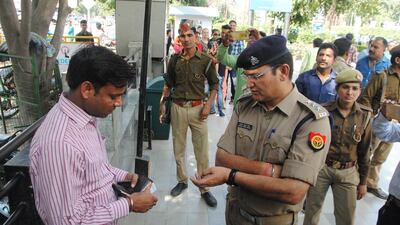MUMBAI // The newly launched “anti-Romeo squads” in Uttar Pradesh, an initiative by the north Indian state’s new government to deal with the widespread problem of harassment of women, are proving highly controversial.
The term “Romeo” in India — which does not accurately reflect its romantic Shakespearean hero’s namesake — refers to men who publicly harass or pester women. They are also sometimes called ‘“eve-teasers” in India, with behaviour typically including groping and catcalls.
But there are also concerns these squads might be crossing into moral policing and may infringe on women’s freedom.
The police patrols were launched in Uttar Pradesh last week after Yogi Adityanath, a Hindu priest, was appointed as chief minister following the Hindu nationalist Bharatiya Janata Party’s (BJP) thumping victory in the elections.
Setting up anti-Romeo squads was a key promise made by Mr Adityanath during the elections in India’s most populous state.
The squads, which are made up of male and female police officers, operate in cities across the state. They patrol colleges, malls, and other public spaces and target loitering youths who they believe might be a threat to women.
The initiative has already resulted in a number of young men being arrested, detained and warned.
However, reports have also emerged of men being reprimanded indiscriminately and unfairly, such as cases of boys waiting outside colleges for their sisters.
“This Big Brother kind of surveillance in India is common and this is a manifestation of that,” said Vandana Shah, a lawyer who specialises in women’s rights, who called the move “regressive”.
“What are your parameters? How do you judge whether this guy looks like a Romeo versus this guy doesn’t look like a Romeo? It’s ridiculous. I think it’s intrusive. I don’t think it’s going to serve any purpose beyond a point and it can easily be misused.”
She said that women had not been given a voice on the issue.
In a Times of India report on Friday, a journalist joined two male and two female police constables on an anti-Romeo patrol. When asked how they could identify young men as Romeos, one of the male constables replied that he could spot them "just by the look in their eyes, their face, and the way they stand".
In some cases, young men were forced to do sit-ups, and the squads shamed them and reported them to their parents, according to local media.
The director general of police in the state, Javed Ahmad, tweeted: “Safety of girls/ladies is the sole intent of the anti Romeo squads. No moral policing.”
Apurwa Pandey, 16, a student in Varanasi in Uttar Pradesh said she believed the “anti-Romeo squad isn’t the most effective way for reducing eve-teasing or harassment” and that the move could limit women’s freedom.
“Such squads legitimise moral policing,” she said.
It was already difficult for couples in India to find areas to socialise, she added. A young man should not have to “answer” to a police officer on his personal life, as long as he was not breaking the law, and he should be free to talk to a woman if he was not harassing her, Ms Pandey said.
The new chief minister, considered to be a firebrand, launched the squads at the same time the new government in Uttar Pradesh cracked down on slaughterhouses. Mr Adityanath is eager to protect cows, which are revered by Hindus. Cow slaughter is banned in the state and after taking office last week, he ordered the closure of illegal slaughterhouses, which led to a number or meat shops and abattoirs being shut in the country.
Meat traders in Uttar Pradesh began an indefinite strike on Monday.
Lawyer Ms Shah said authorities should look at alternative methods to deal with the problem of harassment.
These could include fast-track courts to enforce India’s existing laws on sexual harassment and assault and ensure stricter and faster implementation of them, she said.
“They should have educational programmes for men that are mandatory,” she said. “How do you change the narrative at a grass roots level? There needs to be a change at the larger macro level.”
Self-defence courses for women were another option that could be more effective than the squads and empower women, Ms Shah added.
But there are some who have welcomed the squads.
“I think it’s a good initiative to deal with the problem of eve-teasing and harassment and stop these [related] problems,” said Ritika Agrawal, 17, a student in Uttar Pradesh.
foreign.desk@thenational.ae

